-

Advances in Disability Rights and Law in Japan and South Korea
Celeste Arrington discusses her new book, "From Manners to Rules," on the arrival of clear-cut laws and regulations to enhance disability rights and tobacco restrictions in Japan and South Korea. -

“Japan Re-Emerges”: A Discussion of Ulrike Schaede’s New Book
Brad Glosserman and Ulrike Schaede discuss “Japan Re-Emerges”, her new book on Japan’s Mainoumi strategy and why slow is not stagnant. -

Japan Re-Emerges? – A Discussion of Ulrike Schaede’s New Book, with Nobuyuki Oishi
Nikkei journalist Nobuyuki Oishi joins Ulrike Schaede to discuss her new book “NEW Japan Management (Japan Re-Emerges)." Japan’s leading companies have undergone a quiet transformation, and the results are showing now. -

Entrepreneurs in Japan – A View from History, with Robert Feldman and Kenji Kushida
Robert Feldman of Morgan Stanley in Tokyo and Kenji Kushida of the Carnegie Endowment for International Peace discuss the entrepreneurship in Japan based on the book "History of Innovative Entrepreneurs in Japan" by Takeo Kikkawa. -

Dream Super-Express: A Cultural History of the World’s First Bullet Train, with Jessamyn Abel
Jessamyn Abel explores the cultural history of the 1964 Tokaido Shinkansen, from the transportation technology feat to city scaping, layered cities, and cultural identity. -

Silver Democracy: How Japan’s Aging Politicians Affect Policy Choices, with Charles McClean
While Japan’s central government is run mostly by older politicians, mayors of small- and mid-size cities are often younger. Exploiting this difference, Charles McClean explores whether age results in different policy outcomes -

Urban Life and Spatial Cultures in Post-Growth Japan, with Sam Holden
Sam Holden, a Tokyo-based writer who restores public baths and vacant houses in Tokyo and Hiroshima, discusses how a bottom-up urban life culture can be preserved for post-growth Japan. -
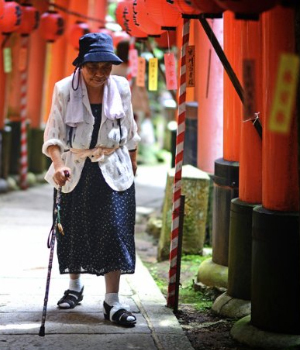
The Leading Edge of Aging: Lessons from Japan, with Sarah Lubman
How is Japan adapting to aging? Sarah Lubman discusses why the rest of the world should pay more attention to Japan's experiences, and how Japan's extreme demographic shifts may inspire an age of innovation. -

How the COVID-19 Pandemic is Shaping Politics in East Asia - An Update, with Yves Tiberghien
How did the Delta and Omicron variants challenge politics and societies across East Asia? Yves Tiberghein discusses the effects of the COVID pandemic on Japan and China, and the long-term implications of pandemic policies. -

Japanese Business in 2023: Rising Uncertainties and Competitive Challenges, with Michael Alfant
Michael Alfant, CEO of Fusion Systems Group, discusses how innovation and entrepreneur differ, how governments can foster both, and how Japanese society differs in its assessment of risk and success, as opportunities for businesses abound in Japan now. -

Green with Milk and Sugar: When Japan Filled America's Tea Cups, with Robert Hellyer
How did sencha become a Japanese cultural icon? Robert Hellyer introduces his new book and explains how the rise of U.S. demand for green tea in the early 20th century created an industry. When this demand subsided in the 1930s, sencha was marketed in Japan as a “health food” and a gift, two roles that it continues to fill to this day. -

The Japanese Welfare State and the Pandemic, with Margarita Estévez-Abe
How has Japan fared through the SARS-COV-2 pandemic? Margarita Estévez-Abe discusses how Japan has kept pandemic-related deaths low through long-standing practices featured at long-term care facilities and societal norms of masking, while non-working women were negatively impacted. -

The New Japan and Changing U.S.-Japan Relations – Insider Impressions from Tokyo, with John Nylin
Japan has changed, and U.S.-Japan relations are evolving accordingly as Japan is no longer the “little brother” but an equal ally. John Nylin discusses this evolution, how it positions the U.S.-Japan dynamic in a changing global order, and how domestic opinion is shifting toward more support of Japan’s new, stronger geopolitical role. -

Religion and Politics in the Aftermath of the Abe Assassination, with Levi McLaughlin
The assassination of Prime Minister Abe has shocked the world in many ways and triggered a new debate about the relation between politics and religion. Levi McLaughlin discusses the religion-politics nexus in Japan, and what may change going forward. -

Girl Culture is No Joke, with Laura Miller
Japan’s “girl culture” and its associated occupations, pastimes, and consumption are often belittled and overlooked. Laura Miller examines their origins, shapes, and significant cultural and economic impact.
-
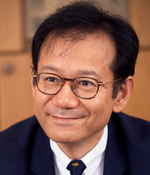
Japan’s Education System: What’s good about it and what needs to change?, with Kan Suzuki
How should Japan’s education evolve in the 21st century? Kan Suzuki discusses Japan’s recent Education Reform, and how the county’s education system is evolving to prepare for the digital transformation. -

Changing Employment Norms and Women in Japan’s Workplace, with Hilary Holbrow
How is lifetime employment changing, and what do those changes mean for career prospects for female professionals? Even as old patterns of long work hours and after-hours drinking become less common, women still run into biases and assumptions, as well as societal pressures on choices and behaviorial norms. -
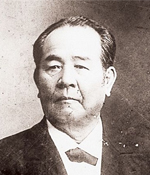
Eiichi Shibusawa's Legacy and Japan's "New Capitalism", with Robert Feldman and Patricia Maclachlan
Prime Minister Kishida Fumio has announced a plan to ensure that Japan’s “new form of capitalism” is good for all. This leans heavily on the tradition of Japan’s “father of capitalism” and “captain of industry”, Shibusawa Eiichi. By increasing the metabolism of the economy and (re)introducing redistribution, Japan hopes that growth in commerce will achieve a "triple win” for business, people, and the economy and society overall. -
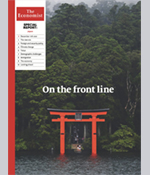
Japan in 2022, with Noah Sneider
Japan is not an outlier, but a harbinger of things to come, which makes it as relevant as ever. Noah Sneider, Tokyo Bureau Chief of The Economist, discusses what lies ahead for Japan in 2022, as the country’s strategies on geopolitics, ageing, digital disruption, climate, environment, market reforms, and “new capitalism” are evolving.
-

Women in Japanese Science, Business, and Politics, with Yuko Harayama
11/30/2021: In Japan, professional women are notoriously underrepresented in STEM and university positions, and even more so in senior business positions and politics. Dr. Yuko Harayama, former member of the Cabinet Office Council for Science, Technology and Innovation and one of the leading women in Japanese science and technology, speaks on the challenges and opportunities for women in today’s Japan, why politics seems so impenetrable, and how business can change toward more diversity and inclusion. -

10/19/2021: By 2050 the populations of China, Japan, and Russia (three of the Indo-Pacific’s most powerful militaries) will shrink by 100 million, even as Asia’s population in totality will increase by over 700 million. Japan, South Korea, and China are aging rapidly, whilst others face youth bulges; meanwhile, novel security threats and technological revolutions are driving adaptation in society. Andrew Oros and Ellis Krauss discuss how these trends combine, and what they mean for the United States’ interests in the region.
-
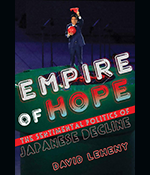
Thwarted Commemorations: The Olympics and Beyond, with David Leheny
7/20/2021: A triumphal 2020 Tokyo Olympics was PM Suga’s ideal vehicle for the message that "Japan is Back". Pandemic delays and dramatic downsizing have muted their appeal, and how it will be remembered is up for debate. In 2018, Abe’s hopes for the 150th Anniversary of the Meiji Restoration were also frustrated, though largely by divergent views of Japan’s political history and the appropriateness of national festivities; these events are often risky when they interact with larger national narratives. -
 07/13/2021: Traditional Japanese architecture and design emerged from a combination of sophisticated environmental sensibility, scarcity of resources, ethical values built over centuries. It displays a deep understanding of how disparate aspects such as forests, buildings, energy, and waste can be approached as integrated wholes, and led to the minimalist aesthetic and constructional ingenuity that is now prized beyond Japan. Lessons abound for contemporary environmental and architectural design problems.
07/13/2021: Traditional Japanese architecture and design emerged from a combination of sophisticated environmental sensibility, scarcity of resources, ethical values built over centuries. It displays a deep understanding of how disparate aspects such as forests, buildings, energy, and waste can be approached as integrated wholes, and led to the minimalist aesthetic and constructional ingenuity that is now prized beyond Japan. Lessons abound for contemporary environmental and architectural design problems.
-
 06/29/2021: Alisa Freedman researches Japanese women who have quietly broken norms, boldly spoken out against oppression, and whose personal decisions have transformed international relations and universities. From 1920s "bus girls" to pioneering professors and even celebrities, women have paved their own way in spite of laws or social conventions that limited their choices and opportunities. How can Cultural Studies dispel stereotypes, teach diversity, reveal hidden histories, and initiate activist movements?
06/29/2021: Alisa Freedman researches Japanese women who have quietly broken norms, boldly spoken out against oppression, and whose personal decisions have transformed international relations and universities. From 1920s "bus girls" to pioneering professors and even celebrities, women have paved their own way in spite of laws or social conventions that limited their choices and opportunities. How can Cultural Studies dispel stereotypes, teach diversity, reveal hidden histories, and initiate activist movements?
-
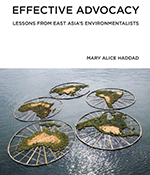
Environmental Advocacy in East Asia, with Mary Alice Haddad
5/25/2021: East Asia is dominated by pro-business governments that are generally hostile to political advocacy. Yet, those same governments have become global leaders in environmental policymaking. East Asia’s environmental advocates must be doing something right—What can we learn from them? Haddad shares insight from her new book, “Effective Advocacy: Lessons from East Asia’s Environmentalists” (MIT, 2021). -
 5/4/2021: Japan’s kissaten (coffee shop) have long served as venues of escape and cultural evolution, offering an unscripted space where everyone from students to salarymen can pursue their interests while enjoying an outstanding cup of coffee. Merry White shares her insights of what we see when we look at Japanese society and politics through the lens of the kissaten.
5/4/2021: Japan’s kissaten (coffee shop) have long served as venues of escape and cultural evolution, offering an unscripted space where everyone from students to salarymen can pursue their interests while enjoying an outstanding cup of coffee. Merry White shares her insights of what we see when we look at Japanese society and politics through the lens of the kissaten.
-
 3/30/2021: When COVID-19 first surfaced in 2020, Japan made global news with its well-handled cruise ship challenge in the Yokohama port; Japan was the poster child of pandemic responses. But in early 2021, the country was hit harder; lockdowns were ordered and hospital limits were reached. One of Japan’s leading public health experts provides insight on the current situation, what health officials are planning, and how to weigh Japan’s prospects.
3/30/2021: When COVID-19 first surfaced in 2020, Japan made global news with its well-handled cruise ship challenge in the Yokohama port; Japan was the poster child of pandemic responses. But in early 2021, the country was hit harder; lockdowns were ordered and hospital limits were reached. One of Japan’s leading public health experts provides insight on the current situation, what health officials are planning, and how to weigh Japan’s prospects.
-
 2/23/2021: When he wrote “No.1” in the 1970s, the late Ezra Vogel aimed to wake up a stagnant America. In an unexpected turn, it greatly impacted U.S. research on Japan and reshaped Japan’s own aspirations. The catchy title and direct U.S.-Japan comparison opened a new discourse across many academic disciplines as well as business and management; the resulting drive to “be number one” lives on today.
2/23/2021: When he wrote “No.1” in the 1970s, the late Ezra Vogel aimed to wake up a stagnant America. In an unexpected turn, it greatly impacted U.S. research on Japan and reshaped Japan’s own aspirations. The catchy title and direct U.S.-Japan comparison opened a new discourse across many academic disciplines as well as business and management; the resulting drive to “be number one” lives on today.
-
 2/9/2021: In Japan’s robust effort to create a new Silicon Valley, what worked for the U.S. may not work on a universal level. Japan must work to build the spirit and excitement of entrepreneurship, balance the desire of the Japanese college graduate between big company stability and start-up culture, and maintain the goal of building demand with great long-lasting companies.
2/9/2021: In Japan’s robust effort to create a new Silicon Valley, what worked for the U.S. may not work on a universal level. Japan must work to build the spirit and excitement of entrepreneurship, balance the desire of the Japanese college graduate between big company stability and start-up culture, and maintain the goal of building demand with great long-lasting companies.
-
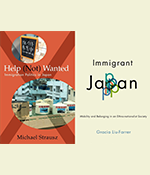
Japanese Immigration Policies with Gracia Liu-Farrer and Michael Strausz
12/8/2020: Japan’s lack of pro-immigration lobbying from labor-intensive businesses and influential strains of thought have hampered efforts to bring in more foreigners, despite policies that are immigrant-tolerant and polls showing public support. Japan must search its cultural toolbox for alternatives to the zeitgeist-dominating ethno-nationalism so they may create a better institutional framework for immigrant integration. -

Women in Japan, with Karen Shire and Saki Tomita
10/20/2020: Shire and Tomita discuss the global STEM disparity, the challenge of societal inertia, compare Germany and Japan on women’s issues, and look to examples from the former that may help the latter. While the many real-life problems that remain despite progress are not unique to Japan, the solutions to more equity and inclusion are very different in Japan’s tight-culture setting. -

Robotics and the DX, with Alberto Moel
9/1/2020: Alberto Moel of Veo Robotics outlines the complexity of factories and distribution centers, and how the U.S, China, Germany, and Japan are competing for dominance of the “digital stack”. The difficulties of digitizing shopfloor equipment makes standardizing, integrating, and harmonizing the industrial process unlikely for the immediate future. Yet, Japan and Germany are positioned to lead the way; they control high-quality factory data for high-level analytics, giving them leverage in the U.S.-China trade war -

A Review of Ruth Benedict and Japanese Culture, with Amy Borovoy
8/25/2020: Amy Borovoy examines how Ruth Benedict’s 1964 classic, The Chrysanthemum and the Sword, provides deep insights and a compassionate look into WWII Japanese society. That behavior is learned – and therefore can be changed – was Benedict’s most significant contribution to cultural anthropology. Borovoy discusses how Benedict was able to help U.S. occupation forces to understand and reshape Japanese assumptions of the West, as well as Western understanding of Japan. -

Innovation, Entrepreneurship, and Change Management, with Gen Isayama
7/28/2020: Japan’s startup culture in Japan has been stunted by seniority-based hierarchies, consensus-based decision making, and a risk-averse culture. Isayama discusses how his company and venture fund, World Innovation Lab, works with Japanese companies to raise social acceptance and corporate renewal. He builds examples of how large Japanese firms can connect with innovators, launch new entrepreneurial units, and monetize R&D advances. -
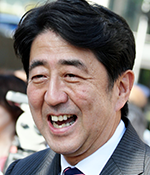
The Politics of Abenomics, with Phillip Lipscy and Harukata Takenaka
7/21/2020: Abenomics has yielded impressive economic growth, but his special actions regarding media control, party discipline, and centralized authority brought growth at the cost of press freedom and parliamentary power. Yet, the strategic Abenomics reforms continue to be popular bipartisan policies with no viable alternatives, and they will endure long past the end of Abe’s term. -
 7/14/2020: The impact of the 2020 Olympics’s postponement on Japan may be salvageable, or disastrous. Athletes may miss their peak, businesses will lose valuable expected revenue, and ticket holders will lose their summer trips. But the biggest challenge may be for the Abe government, which pinned so many aspirations – from diversity and inclusion to showcasing to the world that “Japan is back” – onto 2020.
7/14/2020: The impact of the 2020 Olympics’s postponement on Japan may be salvageable, or disastrous. Athletes may miss their peak, businesses will lose valuable expected revenue, and ticket holders will lose their summer trips. But the biggest challenge may be for the Abe government, which pinned so many aspirations – from diversity and inclusion to showcasing to the world that “Japan is back” – onto 2020.
-

Corporate Governance with Peter Gourevitch
6/30/2020: Two decades of corporate governance reforms have brought great change in Japan, even as its system continues to be quite different from the U.S. or U.K. Long-term value creation and societal stability maintain precedent over stock valuations and financial engineering. Gourevitch suggests that developed countries ditch their obsession with economic growth and follow Japan’s model, prioritizing well-being and affluence over growth metrics. -
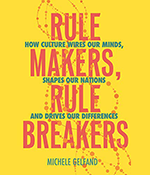 6/23/2020: Professor Michele Gelfand, creator of “Tight-Loose Theory,” lays out how countries differ persistently and significantly in terms of how strong the consensus is on the “right” behavior, and how tolerant people are vis-à-vis deviants. This conversation applies that framework to Japan, from changes in business culture to how society copes with exogenous shocks such as earthquakes or pandemics.
6/23/2020: Professor Michele Gelfand, creator of “Tight-Loose Theory,” lays out how countries differ persistently and significantly in terms of how strong the consensus is on the “right” behavior, and how tolerant people are vis-à-vis deviants. This conversation applies that framework to Japan, from changes in business culture to how society copes with exogenous shocks such as earthquakes or pandemics.
-
 6/16/2020: Religious organizations have played a crucial role in filling the social welfare gap left by the government during disasters like the 3/11 Tohoku earthquake. Since the onset of COVID and social distancing, the number of religious assistance volunteers and available resources have decreased significantly while those in need of help have increased. Greater cooperation may be needed to help those suffering.
6/16/2020: Religious organizations have played a crucial role in filling the social welfare gap left by the government during disasters like the 3/11 Tohoku earthquake. Since the onset of COVID and social distancing, the number of religious assistance volunteers and available resources have decreased significantly while those in need of help have increased. Greater cooperation may be needed to help those suffering.
-
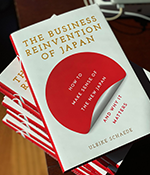
Japan’s Business Reinvention, with Stephen Haggard
6/2/2020: Schaede’s new book The Business Reinvention of Japan outlines Japan’s quiet adaptation into a technology anchor of global supply chains, maintaining its world standing despite setbacks. Developing deep-tech leadership in key input components, large Japanese companies have built an “aggregate niche” strategy to remain competitive. Coupled with workplace reforms and Abenomics, the modern kaisha is nimble and innovative enough to keep Japan at the top. -

Sustaining Entrepreneurism During COVID-19, with Yuichirō Yoshinari and Takashi Kiyoizumi
5/26/2020: Whether in Japan or California, the digital transformation will be crucial during COVID-19. For Japan in particular, the pandemic may be a catalyst for the digitalization they have lagged on, presenting opportunities for companies in innovative sectors. Through strong management, culture change, and customer-oriented strategies, Japanese companies may weather this crisis to emerge even stronger. -

COVID-19 and Changing HR Management, with Kyota Omori, Lei Cao, and David Richards
5/12/2020: COVID-19 has sped up planned work reforms such as flexible working hours and work-from-home, which are now the new normal. Omori shares first-hand experience as chairman of Mitsubishi Research Institute on the challenges that come with improvements. Strong government involvement will be required to ensure lasting, positive change in Japanese work culture change, even after COVID-times. -

COVID-19: Public Health and Medical Systems, with Ryoji Noritake and Douglas Ziedonis
5/5/2020: The emotional effects of COVID-19 include stress and anxiety induced by financial uncertainty, loneliness from social isolation, and strained family lives. First responders are hurt even more, facing high infection and health risks daily. This conversation covers UCSD medical group’s support plans for personnel and the wider community, and the moral dilemmas of prioritizing certain groups to receive resources. -

Politics and Society, with Mizuho Onuma, Kay Shimizu, and Misashi Yoshikawa
4/28/2020: The low-case Abe government’s approval rating has declined, even as comparable others have seen these ratings go up. Experts point to a delayed emergency response and apparent indifference from the Japanese government as the main cause, despite recently improved response. Support programs have kept many businesses alive, allowing Japan to maintain low unemployment and control social distress.
Society
Past JAPAN ZOOMINAR @ UC San Diego that focus on society.
